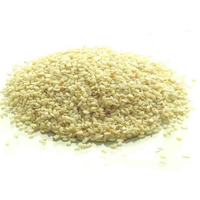Sesame

Sesame is one of the oldest types of seasoning, sometimes you can hear it called "sesame. " Sesame is a small seed size that has a specific but delicate taste. Sesame is an annual plant, the fruits of which are oblong in shape, and inside them are seeds, which are eaten. The color of sesame seeds varies, they can be yellow, white, brown or black. Sesame is often used not only in cooking in different countries, but also for medicinal purposes, in addition, sesame oil is made from it.
In ancient times, sesame was considered one of the ingredients of a potion that brought longevity to the inhabitants, and the inhabitants of ancient Babylon believed that sesame was the food of their gods. In the Middle Ages, this phenomenon was widespread among women: a spoon of sesame had to be chewed per day, it was believed that this had a favorable effect on them. In eastern countries, sesame is probably the most common product, because it is used to cook almost all dishes. Sesame is grown today in different parts of the planet, including places such as Transcaucasia, India, in the Far East.
Benefits of sesame
The benefit of sesame is that oil is prepared from it. The beneficial properties of sesame are due to the content of essential oils in it - antioxidants called semazole and semazinol. Other products cannot boast of the presence of such strong substances in their composition, and if such products are found, the amount of semazole and semazinol is extremely small. It is thanks to these two antioxidants that sesame oil can be stored for quite a long time. The benefits of sesame are also that it contains a large amount of protein, as well as many polyunsaturated fatty acids (PUFA), which determine the beneficial properties of sesame. It is with the help of the two indicated components that sesame has the ability to affect the reduction of cholesterol levels in the blood.
Sesame contains many different vitamins, amino acids, minerals and nutrients that collectively give a person vigor and health. Sesame contains fiber that helps the intestines in its difficult work. Properly treated sesame seeds can provide significant assistance in the event of constipation, and boiled sesame, on the contrary, will help stop diarrhea. Sesame was used by ancient healers in medicine in order to rid a person of a cold or infection. Sesame seeds and oil are often used by cosmetologists in various procedures or in the manufacture of cosmetics. The calorie content of sesame seeds is quite high, so with moderate consumption you will save your figure by acquiring a lot of energy.
Harm to sesame
The harm of sesame is primarily its calorie content, but only if you abuse this product. Also, it is not desirable to eat sesame on an empty stomach, since the mucous membrane of our stomach is very sensitive to sesame seeds. Due to the high calorie content, it is better not to include sesame in the diet, but if you really want, then it is advisable to strictly dose the portions.
sesame 565 kCal
Energy value of sesame (Ratio of proteins, fats, carbohydrates - ju):
Proteins: 19.4 g (~ 78 kCal)
Fats: 48.7 g (~ 438 kCal)
Carbohydrates: 12.2 g (~ 49 kCal)
Energy ratio (b | y): 14% | 78% | 9%
 Español
Español Français
Français Português
Português Русский
Русский 简体中文
简体中文 繁體中文
繁體中文 日本語
日本語 한국어
한국어 العربية
العربية Türkçe
Türkçe Қазақ
Қазақ Deutsch
Deutsch Italiano
Italiano Українська
Українська
